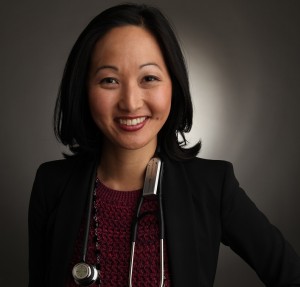 By Julielynn Wong
By Julielynn Wong
Julielynn Wong, MD, is an alumnus of Singularity University. She edited a textbook entitled "Surgery in Space" and trained in space medicine at NASA Johnson Space Center.
Doctors may soon face requests to provide medical clearance for commercial space travelers and these decisions could impact the growth of the private space industry, according to a new analysis.
This article, published in the Christmas 2012 issue of the British Medical Journal, reviewed industry reports and medical studies to help guide physicians who may have to answer questions and fill out fitness to fly certificates for the growing ranks of aspiring space travelers.
"Commercial investment is bringing space tourism closer to reality," said study lead author Dr. S. Marlene Grenon, a cardiovascular surgeon and assistant professor of surgery at the University of California, San Francisco. "Suborbital flight opportunities are currently being planned by companies such as Virgin Galactic, Armadillo Aerospace, and XCOR."
A July 2012 Federal Aviation Administration report estimates the market demand for reusable suborbital vehicles could grow to a total of 13,134 seats over a decade and bring in over $1.6 billion.
"With more opportunities for space tourism, an increasing number of less healthy individuals can be expected to fly," Grenon said, adding that the exact nature of the effects of spaceflight on medical conditions are yet to be determined.
"Dr. Grenon and colleagues have emphasized the difficulties in commenting upon the fitness -- or lack thereof -- of potential candidates for spaceflight," said Dr. Andrew W. Kirkpatrick, a military trauma surgeon and professor of critical care medicine at the University of Calgary and Foothills Medical Center in Alberta.
Passengers should be informed of the lack of advanced medical and surgical care capabilities in current commercial spaceflight platforms, said Kirkpatrick, who was not involved with this study.
Just how far can the medical envelope be pushed? Consider that Stephen W. Hawking -- the ventilator-dependent, wheelchair-bound British physicist with longstanding motor neuron disease -- is slated to fly onboard a Virgin Galactic suborbital flight.
Space medicine experts say that suborbital flights are less risky than orbital missions because suborbital passengers experience about one to five minutes of microgravity.
"Most people with well controlled medical conditions are capable of withstanding the acceleration forces involved with the launch and landing of commercial spaceflight vehicles," Grenon said.
The FAA has not made any specific statements on medical requirements for commercial space passengers, the BMJ authors noted. Instead, the FAA has opted to leave the medical screening process up to the commercial space vehicle operators. "Experience in aviation medicine has shown that over-regulation could inhibit development of the sector," Grenon said, adding that a delicate balance -- between prioritizing passenger safety and avoiding overly strict medical criteria that could decrease the market -- is needed to make the commercial spaceflight industry viable.
"If a potential space traveler asks his or her physician for a medical letter of clearance for space travel, the physician will share responsibility for determination of suitability with the commercial space operator," she said.
While the International Space Station is currently the only orbiting space tourist destination, other extended stay commercial spaceflight opportunities could exist in the future, the authors wrote.
"It may be possible to fly to an orbiting Bigelow Aerospace hotel or laboratory in the future," Grenon said. "Mining companies may send employees to the Moon or near-Earth asteroids to mine planetary resources."
Once a passenger has disembarked from their space vehicle, there are much greater uncertainties that complicate medical decision making, Kirkpatrick said.
"Adverse physiological changes that increase susceptibility to critical injury or illness may be established within hours of leaving Earth's gravity," he said. "Chronic medical conditions may be exacerbated and unexpected acute emergencies may be more serious than on Earth."
As extended stay commercial spaceflight opportunities develop, doctors will likely adjust the medical standards governing who can live and work in space. Disabled individuals could adapt and perform as well as their able-bodied counterparts in space, said one former physician-astronaut.
"People with disabilities will be able to fly in space just fine," said Dr. Dan T. Barry, a retired NASA astronaut and physical medicine and rehabilitation physician, who was not involved with this study. "Many mobility impairments will be gone in the space environment."
Visit X PRIZE at xprize.org, follow us on Facebook, Twitter and Google+, and get our Newsletter to stay informed.
This material published courtesy of Singularity University.